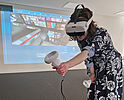Background
Virtual reality exposure therapy is increasingly being used as a promising method for treating addictive disorders. Patients are placed in virtual environments that represent potential triggers for their addictive behaviour. Through repeated exposure in a controlled environment, they can learn to deal with these triggers and develop alternative coping strategies.
Virtual reality exposure therapy enables patients to practise responding to addictive triggers in a safe and controlled environment without exposure to real risk - ie being in the presence of an alcoholic drink or gaming machine. This can help to reduce their anxiety and cravings and strengthen their ability to self-regulate.
Research and studies
Studies analysing the use of VR exposure therapy for addiction disorders are promising and show positive results. Research has shown that VR therapy can be effective in reducing cravings for addictive substances, lowering relapse rates and strengthening patients' self-control. In addition, studies have shown that the immersive nature of VR therapy can help increase patient motivation and improve their ability to cope with addiction triggers. Although more research is needed to confirm the long-term effectiveness and benefits of VR exposure therapy for addiction, the studies to date suggest that it is a promising treatment alongside conventional methods.
Product and partner
In our facilities the ‘VR Coach smart system’ is used. This includes VR scenarios in which users have the opportunity to interact with their environment as well as 360-degree films. The product also offers therapist software. This allows therapists to follow what patients see in VR on a notebook. It can also be used to intervene in what is being experienced. Elements can be added (e.g. talking avatars), allowing the experience to be gradually intensified.
Objectives and target group
The objectives of using virtual reality exposure therapy for addiction disorders are diverse. These include reducing cravings and symptoms of addiction, promoting abstinence and relapse prevention, improving coping strategies and increasing patients' self-confidence and self-control. Overall, virtual reality exposure therapy can make a significant contribution to the integrative treatment of addictive disorders.
In general, VR therapy can be used in the MEDIAN Group facilities for all patients suffering from addiction. A therapist will individually assess whether VR therapy is suitable for the respective patient, based on their specific needs and state of health.
Innovative aspect
The use of virtual reality (VR) exposure therapy for addictive disorders in rehabilitation offers an innovative approach to support the recovery process. By re-creating real-life situations related to addictive behaviour, patients can learn to cope with their triggers and cravings in a controlled environment. This allows patients to develop new coping strategies and strengthen their ability to self-control, which should support them in their lives outside the rehabilitation centre. The immersive nature of VR therapy can also help to reduce cravings for addictive substances and minimise the risk of relapse. Ultimately, the use of VR exposure therapy for addiction treatment offers an innovative way to individualise therapy and promote long-term patient outcome.
Technology-supported therapies, such as VR therapy, also offer the opportunity to reduce the workload for treatment teams, make everyday treatment more varied and improve treatment outcomes and the patient experience.
Pilot testing and implementation
The pilot project ‘VR-supported therapy in addiction’ is being carried out in 5 MEDIAN Group clinics in Germany:
- MEDIAN Rehazentrum Daun - Thommener Höhe
- MEDIAN Klinik Wilhelmsheim
- MEDIAN Klinik Tönisstein
- MEDIAN Psychotherapeutische Klinik Bad Liebenwerda
- MEDIAN Klinik Odenwald
